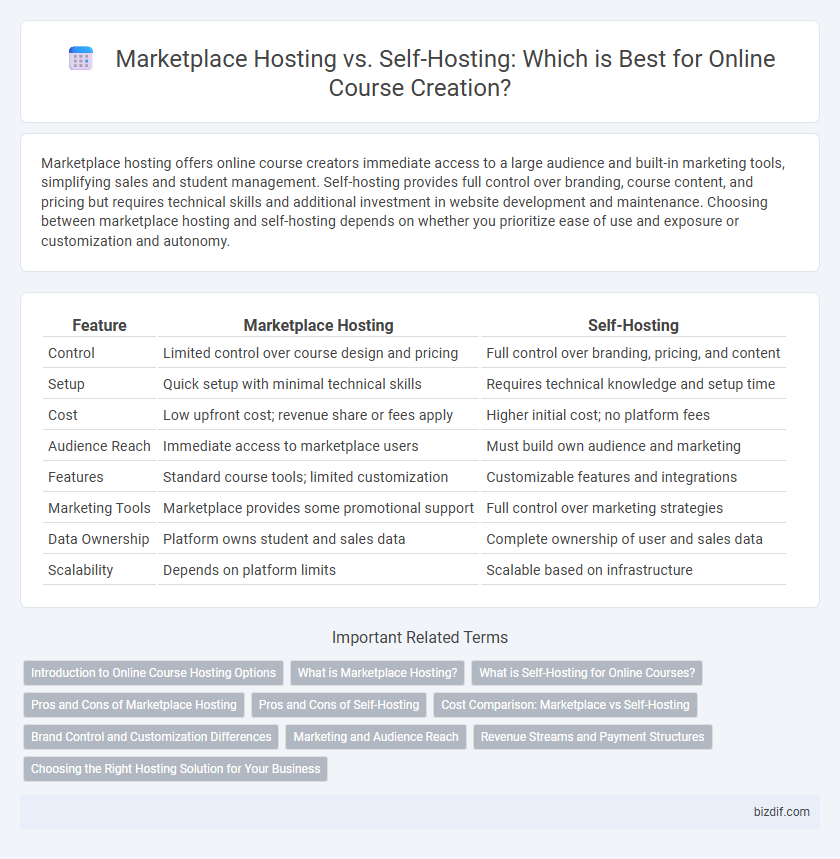Marketplace hosting offers online course creators immediate access to a large audience and built-in marketing tools, simplifying sales and student management. Self-hosting provides full control over branding, course content, and pricing but requires technical skills and additional investment in website development and maintenance. Choosing between marketplace hosting and self-hosting depends on whether you prioritize ease of use and exposure or customization and autonomy.
Table of Comparison
| Feature | Marketplace Hosting | Self-Hosting |
|---|---|---|
| Control | Limited control over course design and pricing | Full control over branding, pricing, and content |
| Setup | Quick setup with minimal technical skills | Requires technical knowledge and setup time |
| Cost | Low upfront cost; revenue share or fees apply | Higher initial cost; no platform fees |
| Audience Reach | Immediate access to marketplace users | Must build own audience and marketing |
| Features | Standard course tools; limited customization | Customizable features and integrations |
| Marketing Tools | Marketplace provides some promotional support | Full control over marketing strategies |
| Data Ownership | Platform owns student and sales data | Complete ownership of user and sales data |
| Scalability | Depends on platform limits | Scalable based on infrastructure |
Introduction to Online Course Hosting Options
Marketplace hosting platforms like Udemy and Skillshare offer built-in audiences and streamlined tools for course creation but charge fees and limit pricing control. Self-hosting through platforms such as Teachable or Thinkific provides full control over branding, pricing, and student data while requiring more technical setup and marketing effort. Choosing between marketplace hosting and self-hosting depends on balancing ease of access to learners with customization and revenue goals.
What is Marketplace Hosting?
Marketplace hosting is a platform-based service where creators upload and sell their online courses within an established marketplace, benefiting from built-in audience traffic and marketing tools. This hosting model typically handles payment processing, course delivery, and customer support, streamlining the administrative workload for instructors. Popular examples include Udemy, Skillshare, and Coursera, which offer extensive user bases and discoverability but often charge revenue-sharing fees.
What is Self-Hosting for Online Courses?
Self-hosting for online courses involves managing the entire course platform on your own server or web hosting service, giving full control over customization, branding, and data ownership. This approach requires handling technical aspects such as security, updates, and payment processing independently, which can be resource-intensive but offers greater flexibility. Platforms like WordPress with LMS plugins or custom-built websites are common solutions for self-hosting online course content.
Pros and Cons of Marketplace Hosting
Marketplace hosting offers easy access to a broad audience and simplifies technical setup by handling payment processing, security, and platform maintenance. However, it often involves high commission fees, limited pricing control, and less flexibility in branding and course customization. Course creators may also face increased competition and dependency on the marketplace's policies and algorithms.
Pros and Cons of Self-Hosting
Self-hosting an online course offers full control over content, branding, and user experience, allowing customization tailored to specific educational goals. It eliminates platform fees and fosters direct customer relationships but requires managing technical aspects like website maintenance, security, and payment processing. The initial setup cost and ongoing technical responsibilities can be significant challenges for educators without IT expertise.
Cost Comparison: Marketplace vs Self-Hosting
Marketplace hosting typically involves lower upfront costs with a revenue-sharing model or monthly fees, making it accessible for beginners. Self-hosting demands higher initial investment in web hosting, platform setup, and maintenance but offers greater control and potential long-term savings. Evaluating expenses like transaction fees, platform charges, and technical support is essential for an informed cost comparison between marketplace hosting and self-hosting.
Brand Control and Customization Differences
Marketplace hosting offers limited brand control and customization, as course creators must adhere to platform templates and branding guidelines, which can dilute unique brand identity. Self-hosting enables full control over website design, user experience, and branding elements, allowing for tailored customization that aligns closely with a creator's vision. This flexibility enhances brand consistency and fosters stronger audience trust, crucial for building a distinctive online course presence.
Marketing and Audience Reach
Marketplace hosting offers built-in audience access and robust promotional tools, enabling course creators to quickly reach a large, targeted customer base. Self-hosting provides full control over branding and marketing strategies but requires significant effort to build traffic and manage SEO, email campaigns, and social media outreach. Choosing marketplace hosting can accelerate audience growth, while self-hosting ensures personalized marketing tailored to niche segments.
Revenue Streams and Payment Structures
Marketplace hosting offers streamlined payment processing with integrated revenue shares, allowing creators to access a broad audience but ceding a percentage of their earnings to the platform. Self-hosting enables full control over pricing models and direct payment processing, maximizing profit margins but requiring investment in payment gateway setup and compliance. Choosing between these options impacts revenue streams significantly, balancing ease of entry against customization and financial autonomy.
Choosing the Right Hosting Solution for Your Business
Marketplace hosting offers built-in traffic and easy setup, ideal for creators seeking quick audience access and reduced technical management. Self-hosting provides full control over branding, content, and pricing, enabling tailored customer experiences and scalability for long-term growth. Selecting the right hosting solution depends on your business goals, budget, and desired level of autonomy in course management.
Marketplace hosting vs Self-hosting Infographic

 bizdif.com
bizdif.com